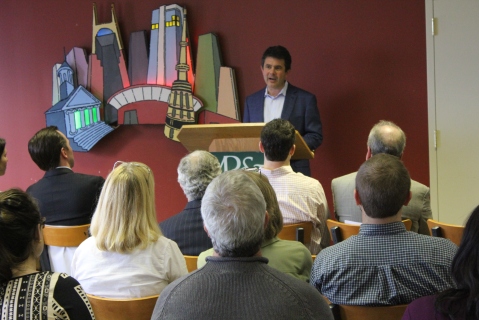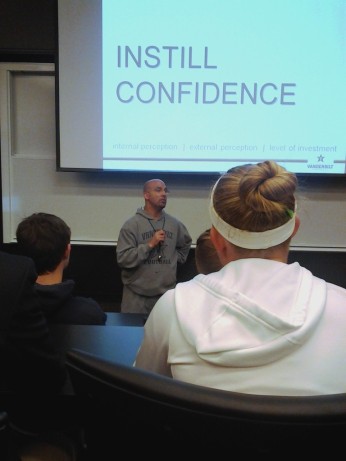Not just what you say, but how you say it: Lessons from James Franklin, Sen. George Mitchell and David Goldhill
March 20, 2013
What do the CEO of the Game Show Network, the former U.S. Senate majority leader and an SEC football coach have in common?
More than I ever imagined.
In just the last two days, I had the good fortune to meet and listen to David Goldhill, the television executive, George Mitchell, the former politician, and James Franklin, the Vanderbilt football coach, speak to groups here in Nashville about issues ranging from health care to peace in the Middle East to building a successful football program. As a PR person, I was especially interested, not only in what these successful leaders had to say, but in how they said it.
David Goldhill, CEO of Game Show Network and author of “Catastrophic Care”

Author David Goldhill speaks at the MP&F Speaker Series event, hosted with the Columbia University Club of Nashville.
- David has written a book about the U.S. health care system, inspired, sadly, by the death of his father due to an infection he picked up in the hospital unrelated to what had brought him there in the first place. He visited Nashville as part of the MP&F Speaker Series on Monday night.
- The first thing I noticed about David’s book was its size – it’s a hardcover book, but it measures just 7.5 inches by 5 inches, much smaller than the typical hardcover. I asked David why he had done that, and he said it was because he wanted the average person to feel that the book was accessible, something they could handle. A large book on a subject as seemingly complex as health care, he said, would turn off the very readers he’s targeting. I doubt David would have been invited to appear on The Colbert Report if his book was perceived as a wonkish, policy-heavy slog. Paying as much attention to the packaging of his important message as the message itself was a brilliant decision.
Sen. George Mitchell

Sen. George Mitchell
- Mitchell was in town to speak to Vanderbilt students Monday night at the university’s annual Impact Symposium. The man’s list of credentials and achievements is extraordinary, and varied: Senate majority leader, peace negotiator in Northern Ireland, the Middle East and the Balkans, leader of Major League Baseball’s steroid investigation, etc.
- All that said, the things that stood out to me the most about Mitchell were his disarming self-awareness, his modesty and his sense of humor.
- It was clear that Mitchell did not want the enormous gap between his stature and place in life and that of his student audience to have any sort of chilling effect on the students, to undermine his ability to effectively communicate with his audience and stifle conversation.
- So, while he talked about brokering peace in Northern Ireland, and encounters with presidents and dealings with Yasser Arafat, he also told stories about his modest upbringing, about working as a janitor as a kid, about how he felt inferior to his more athletically talented brothers. He told the audience that his wife had once reminded him that he had entered into one particular peace negotiation with zero expectations – and had met them!
- Above all, Mitchell came across as a real human being. I have no doubt that his audience was influenced to buy into his more important messages on controversial topics simply because he was funny, likeable and real. No doubt this approach to communication is a big reason why he was such a popular figure on both sides of the political aisle during his time in the Senate.
Coach James Franklin
- In his first two years as Vanderbilt football coach, James Franklin has accomplished things that have either never been done at Vanderbilt, or were last achieved back in the era of leather helmets. Back-to-back bowl games, a nine-win season, five SEC victories last year, a top-20 recruiting class, etc.
- Speaking to a group of freshman students last night, Franklin talked about all the important behind-the-scenes steps that had to take place in order to change the culture and perception of the football program, and to get his own players to believe they could achieve success.
- A lot of this, he said, came down to messaging: relentless, positive, consistent messages delivered by anyone and everyone who came into contact with his players. He knew he had turned a corner when his players – whether in interviews with the media or in conversations with teammates or coaches – were repeating those same messages about winning, hard work and attention to detail.
- Two other things about Franklin’s remarks stood out to me.
- One initially sounded a bit counterintuitive. He said leaders sometimes focus too much on goals. What’s more important, he believes, is process. In his first year at Vanderbilt, his team won six games, a pretty big achievement at the time for Commodore football. What if, he said, he had set a goal for the team to improve to seven wins the next season? Or even eight? The goals would have actually imposed a restriction on his team, a satisfaction that would have arrived too early. Vanderbilt ended up winning nine games. What was more important than setting a goal was to focus on the little things, the everyday processes that add up to success. The average play in a football game lasts just six seconds. He asks his players to be excellent for six seconds. Then another six seconds, and another.
- The other thing that impressed me was the enthusiasm and seriousness with which Franklin approached his opportunity to speak with the freshmen. He had just walked off the field from a spring practice session. These weren’t wealthy donors, potential recruits, important members of the university administration or faculty – they were “just” freshmen taking a class on Sports and Society. But Franklin prepared a special PowerPoint presentation just for them. He spoke and took questions for nearly two hours. He was emotional, motivating. He even took the opportunity to do a little coaching, telling one kid whose cellphone kept ringing to always remember, for the rest of his life, to set his phone to vibrate. Franklin said he tells his players to do backflips out of bed each morning, to embrace life with enthusiasm and to be excellent at every single thing they do. Franklin could have given less than his best when speaking to some freshmen. But he approached the task as if his audience was the most important in the world, and I don’t think there’s any doubt those kids will now be raving fans.
Follow Andrew Maraniss @trublu24
Follow James Franklin @jamesfranklinvu
Follow David Goldhill @david_goldhill
After completing a semester-long internship with MP&F, I’ve realized that the skills I attained in my undergraduate education can also apply in a real-life work setting. I’ve had to defend my decision to major in both English and history multiple times during the last two years, because neither of my liberal arts degrees provides me with a direct career path. It hasn’t always been easy for me to articulate how I will use what I’ve learned in my course work in a career.
My English major is all about using the written word to convey a well-supported argument in a clear and concise manner. In my history classes, I research primary accounts and secondary commentary to draw conclusions about history and create my own arguments. As an MP&F intern, I’ve learned that the public relations field requires this same level of critical thinking and argument formation. While I haven’t been asked to research and write about The Great Gatsby or the Cuban Missile Crisis, I find specific information pertaining to client news and projects and then use this information to create messages.
The end goal is the same when writing a term paper and a client message: To inform an audience about a specific topic and its relevance to their lives. Knowing how to write and research effectively is essential for any job in communications, and I can thank my English and history classes for training me in both of these areas. And I can thank McNeely Pigott & Fox for showing me how useful a liberal arts degree can be.
